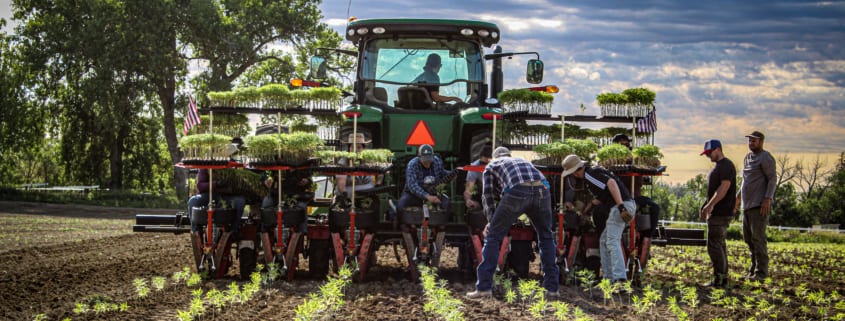A new crop is showing up on farms across the country. In August of 2018, U.S. farmers planted 27,424 acres of hemp. Just a year later, that number skyrocketed to 128,320 acres across the country and 2020 numbers are now at a whopping 465,762 acres. What is behind this jaw-dropping increase in hemp farming? The answer is that hemp offers farmers a variety of great benefits. This versatile and sustainable crop can be a great addition to most farms. Here are 10 useful benefits of hemp farming.
1. Hemp Can Grow Almost Anywhere in the United States
Many farmers are limited by the crops that will grow in their planting region. This may mean certain lucrative cash crops are out of reach. Not so with hemp (at least for most farmers). Hemp is a highly robust crop that can grow nearly anywhere, except for very dry deserts or high, mountainous areas where large-scale agriculture doesn’t happen anyway.
Chances are that you can successfully grow industrial hemp at your farm. Note, however, that hemp does grow best in well-drained soil, so you may need to do a little extra work if your soil doesn’t offer ideal drainage.
Want to get started growing hemp? Download our 2021 Hemp Growing Guide
2. Hemp Is an Endlessly Versatile Crop
From paper to biodiesel fuel to wellness-promoting oil, hemp can be turned into an almost endless supply of different products. In fact, there are over 25,000 different uses for hemp, including food, building supplies, textiles, skincare products, oils, and more. Every part of a hemp plant can be used in some way, shape, or fashion.
This versatility gives farmers growing hemp many different options when it comes to making a profit on their hemp crop. They may even be able to harvest different parts of the hemp plant to earn even more from each harvest.
3. Hemp Can Offer a Great ROI
Let’s get down to business: Farmers need to earn a living, and hemp is a great way to do it. Many farmers are making a strong profit by growing hemp for CBD and/or CBG. CBD is extremely popular in the health and wellness industry, and interest in CBG is quickly rising. According to a 2019 article in The Fresh Toast, while farmers typically earn $1,000 per acre of corn, some hemp farmers have reported earning as much as $30,000 to $40,000 per acre growing hemp for CBD. These results are not typical of all hemp farmers, especially new farmers, but it does speak to the earnings potential that CBD and CBG can offer.
Interested in making a greater profit on your hemp crop? Take a look at our 10 tips for increasing hemp farm profits
4. Hemp Is a Highly Robust Crop
Risk comes with the territory for farmers. There’s always the chance that a crop can be damaged by rough weather, pests, or disease. While hemp is not impervious to these harms, it is a highly robust plant. Hemp is known for being resistant to common pests and diseases that can take down other, more vulnerable cash crops. Additionally, because hemp tends to grow so quickly, it usually outpaces weeds that could compete with it for resources.
That doesn’t mean farmers growing hemp can afford to take their hands off the wheel and assume their crop will grow without any problems. Farmers need to always keep an eye on their hemp crop for any signs of disease or pest issues.
5. Autoflower Hemp Can Grow in 75 Days
Farmers in colder climates need to work within a short growing season. On the flip side of the coin, farmers in warmer climates may have the ability to plant more than one harvest in the same field. In both cases, autoflower hemp seeds can give farmers the fast grow time they need. Autoflowers typically mature in 70 to 75 days, which cuts weeks off the time of full-term hemp (which may take 100 to 120 days to mature). Autoflowers are a great option for a short growing season or can give farmers more flexibility in planning their crops and getting the most use out of their field.
Here’s what you need to know about growing autoflower hemp
6. Hemp Nourishes Your Soil
Most cash crops leach nutrients from the soil in order to grow, forcing farmers to continually add chemical fertilizers into their fields. Some farmers are adopting the old tradition of rotating their fields to give their soil time to recover. Hemp can speed up this process by actively revitalizing the soil.
Hemp roots reach deep into the soil to hold it together and prevent erosion. The roots also loosen up the soil, making it more welcoming to the next crop. While a hemp crop is planted, it naturally aerates the soil and adds helpful deposits of carbon dioxide into the soil.
Lastly, hemp creates a lot of healthy biomass after it is finished growing. Farmers who grow hemp for CBD or CBG only need to remove the plant’s leaves and buds, and can turn the rest into biomass that can decompose and feed nutrients back into the soil. All these factors can revitalize soil.
7. Hemp Doesn’t Need Lots of Water
Water isn’t cheap no matter where you live. Farmers in dryer areas of the country, like in the southwest, have to pay even more for water, which may make thirsty crops, like avocados and almonds, expensive crops to grow. While hemp is not technically a low-water crop, it does require less water than many water-hungry crops.
Farmers who want (or need) to keep their water bill low can do so by growing hemp.
8. Hemp Doesn’t Require as Much Pesticide and Herbicide
The EPA has a number of approved pesticides and herbicides that can be applied to hemp crops. Each state also has its own rules and regulations so the state Agriculture Department should be contacted. Despite the EPA’s approval, many, if not most, CBD hemp farmers prefer to maintain the chemical purity of their crop. They prefer to use biologics and Integrated Pest Management to maintain the purity of their product in order to maximize downstream product value.
9. Hemp Is a Great Way to Diversify Your Crop
One of the ways farmers balance out risk is to diversify their crops. Hemp is a great option for farmers who want to lower their risk by adding a new crop to their portfolio. All of the benefits of hemp farming we’ve already pointed out help make a great case for diversifying with hemp.
Hemp grows fast, nourishes the soil, doesn’t require a lot of water or chemicals, and can be turned into lots of different products—and it can offer a great ROI. If you want to switch things up on your farm, it’s time to start thinking about hemp farming.
Here’s how to start a hemp farm
10. Hemp Is Good for the Environment
Farmers understand that combating climate change is synonymous with protecting the future of farming. Hemp can help with that battle. Aside from requiring fewer chemicals and less water than most cash crops, and helping to prevent soil erosion, hemp does one other great thing for the environment: it loves to gobble up carbon dioxide, which it then feeds right into your soil. According to the Hemp Foundation, “Experts say that every ton of hemp can sequester 1.62 tons of CO2.”
Hemp is also actively being used as a sustainable alternative to many different materials. An acre of hemp can produce as much paper as four to 10 acres of trees, and hemp grows to maturity in four months, whereas trees require in 20 years or more to reach maturity. Companies have also started experimenting with hemp plastic and “hempcrete”, a building material that is actively being used in Europe and is starting to appear on U.S. building projects. Researchers have also found that hemp biodiesel is a viable and renewable fuel alternative.
Why Plant Hemp?
You’ve now got 10 reasons to seriously consider hemp farming. Hemp is hardy and robust. You can grow it nearly anywhere, including places with a short growing window or areas of the country with limited water. Hemp can be turned into nearly anything, giving you lots of options to make money by meeting market demand. Achieving a high ROI with hemp is possible, especially if you grow hemp for CBD or CBG. Hemp can also keep your soil healthy, limit your use of pesticides and herbicides, and help you fight climate change.
Want to know even more benefits of hemp growing? Contact High Grade Hemp Seed today. We’d love to tell you about the unique benefits of our CBD hemp strains and our Matterhorn CBG strain.



